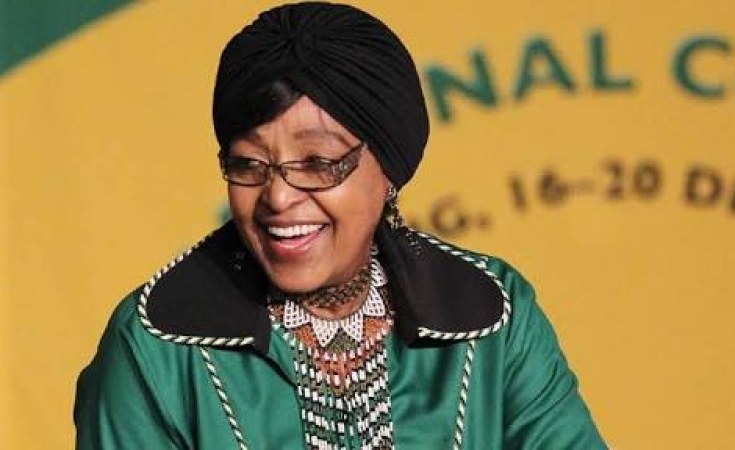Winnie Mandela passed away earlier this month at age 81. South Africa’s largest newspaper, the Sunday Times, opened its obituary by referring to her as a “a stalwart in the fight against apartheid”. The Daily Sun, another top newspaper in South Africa, announced Winnie’s passing “with profound sadness”. After all, she was considered the Mother of the Nation, through ups and downs—South Africa’s and her own. Since her passing, the specter of Winnie’s legacy has begun to take shape as writers and commentators paint the picture of a complex woman. Despite her demons and her controversial politics, Winnie played a crucial role in the formation of post-Apartheid democracy, and the outpouring of national grief at her funeral last week speaks to her enduring legacy. Western media, however, seems incapable of grasping this nuance, and its coverage of Winnie’s passing exposes a profound lack of consideration toward African women’s history. This latest exposure of extreme bias underscores what we already know: it is crucial for posterity that African women have the opportunity to tell their own stories.
W.E.B. Du Bois first wrote about “double consciousness” in 1903. He wanted people to understand what it was like to see oneself through the eyes of one’s oppressor. Scholars have reflected in the time since on the existence of a derivative phenomenon: triple consciousness, which refers to the additional layer of scrutiny applied to black women, black immigrants, or other extra-persecuted sub-groups. The discrepancy between Winnie Mandela’s obituaries in the Western press versus the local South African media exposes the extent of this disconcerting tendency, and underscores the need for local voices to have greater access to global platforms. Take, for example, the opening line in the New York Times obit: “Winnie Madikizela-Mandela[’s …] hallowed place in the pantheon of South Africa’s liberators was eroded by scandal over corruption, kidnapping, murder and the implosion of her fabled marriage to Nelson Mandela.” Or the Guardian: “Rarely can there have been someone who was called to greatness and yet failed that calling as decisively as Winnie Madikizela-Mandela.” There is no denying that Winnie bears responsibility for violent tactics and corruption. But don’t her accomplishments—serving as a leading opponent of Apartheid during and after her husband’s imprisonment, surviving extensive detention and torture herself, and even winning the Robert F. Kennedy Human Rights Award—merit some consideration in the formation of her legacy?
Unfortunately, women in general, and black women in particular, are often reduced to the default, patriarchal discourse to a single storyline—in both life and death. When Winnie was younger, before her divorce and other controversies emerged, Western media canonized her a symbol of the liberation struggle. The New York Times referred to her in 1985 as a “vigorous symbol of resistance… (a) woman rich in grace and dignity.” And yet, despite the fact that she remains a hero to many in South Africa, her global narrative has fundamentally changed. No longer characterized by revolutionary spirit and personal elegance, she is now remembered in the West as “personally militant […and] lonely.” While important men with mixed histories tend to be lauded after death, or at least remembered as having had both strengths and weaknesses, women with complex backgrounds are typically reduced to their own lowest common denominator. For Winnie, a life of activism has been reduced to a legacy of violence and misfortune in the international press.
There seems to be a particularly profound confusion regarding Winnie’s embrace of violent tactics. Andrew Malone referred to her as the “blood soaked bully who shamed Mandela” in the vicious, almost gleeful Daily Mail obituary, recalling with disgust (“she was a disturbed individual”) how she turned to violence during the anti-Apartheid movement. It’s not that such tactics are unusual in the course of revolution, but perhaps they are inconceivable from a woman. In the wake of Winnie’s death, the story of Yaa Asantewaa, Queen Mother of Ejisu in the Ashanti Empire, comes to mind. Yaa led an army of 5,000 against the British colonialists, eventually getting captured and exiled to the Seychelles, where she died. Like countless other African heroines, Yaa’s story has been relegated to the margins. When men, particularly white, Western men, are the authors of history, a revisionist world often emerges that either sidelines the participation of women or discredits their contributions.
Stories about Winnie Mandela have always been reductionist. Throughout her life, she was at times Mandela’s graceful wife, or a violent radical, or the mother of a nation. In reality, she was all of these things. But African woman do not get the luxury of being complicated, and it seems that the narrative path of least resistance is often the darkest one. Her death and the obituaries that followed serve as an important call for African women to fight through the perversions and distortions and write their own histories. Chimamanda Ngozi Adichie, Yaa Gyasi, Mo Abudu, and Amma Asante have already demonstrated that there is a global audience for authentic stories from African women, but so much more content—in film, literature, television, and online—is needed in order for our own words and contributions to be more than just footnotes in another’s rendering of our story.
Afua Osei is an entrepreneur, investor and co-founder of She Leads Africa, a media company for millennial African women.


